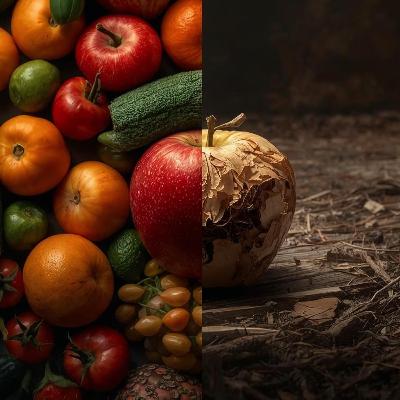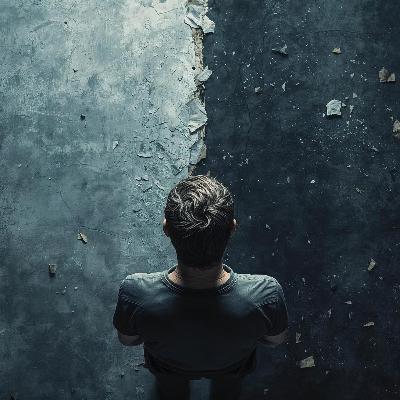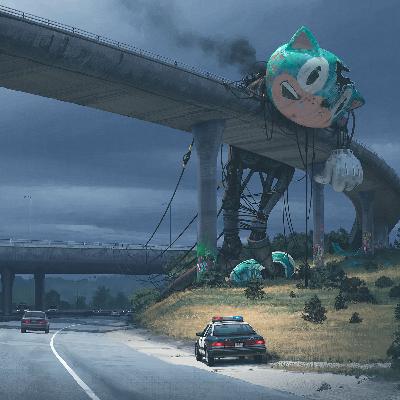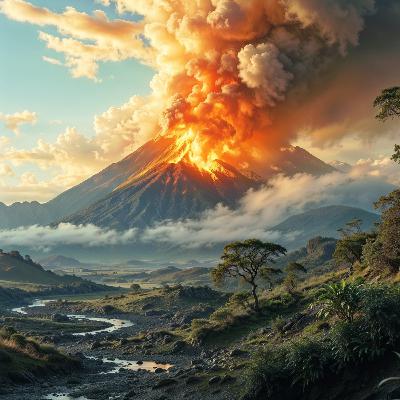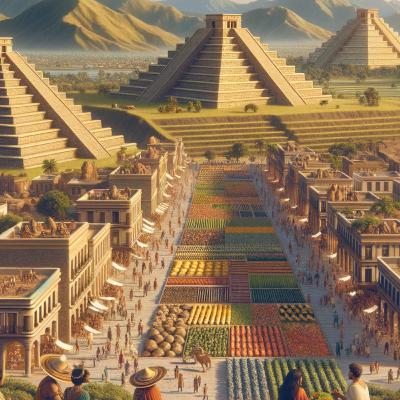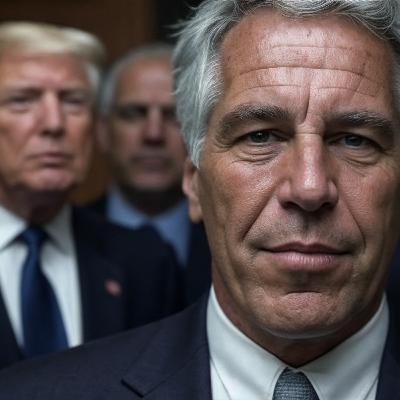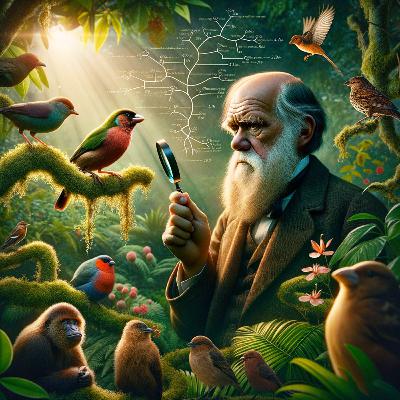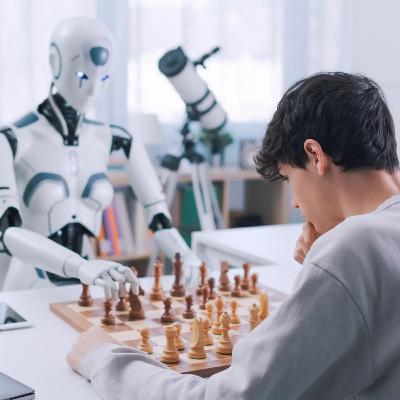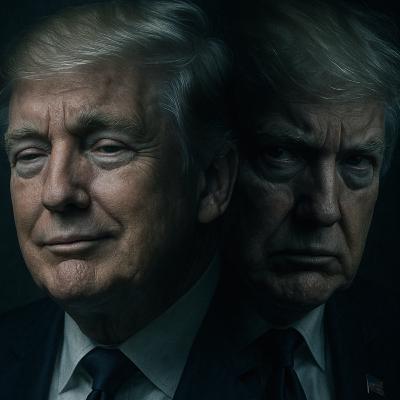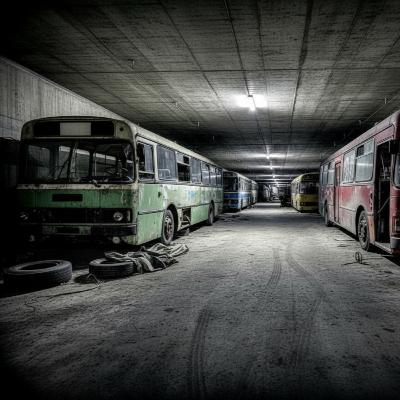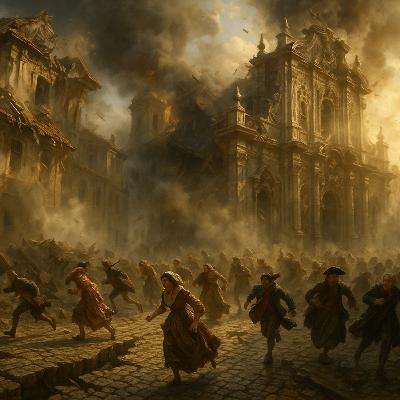Discover The Urban Herald
The Urban Herald

132 Episodes
Reverse
What millions celebrate as Halloween, a night of costumes, candy, and carved pumpkins, began over 2,000 years ago as Samhain, a sacred Celtic festival marking the thinning of the veil between worlds. This episode explores the extraordinary journey of how a profound spiritual observance in the Irish countryside became the world's second-largest commercial holiday, generating billions in revenue while somehow preserving its mystical soul.From the sacred fires of Tlachtga to contemporary celebrations across continents, we uncover the fascinating story of cultural evolution, religious syncretism, and commercial adaptation that spans millennia. Discover how Christian missionaries transformed pagan Samhain into All Hallows' Eve, why jack-o'-lanterns were originally carved from turnips (and were genuinely terrifying), and how Irish immigrants brought these traditions to America where pumpkins replaced turnips.We debunk persistent urban legends, including the thoroughly discredited poisoned candy panic that has generated decades of parental anxiety despite being almost entirely unfounded. We explore Halloween's staggering commercial impact (over £12 billion annually) and the emerging sustainable Halloween movement reshaping how we celebrate.In 2025, Ireland is experiencing a remarkable cultural renaissance, with the Derry Halloween Festival attracting over 100,000 visitors and County Meath's Púca Festival reviving authentic Samhain rituals at the very birthplace of Ireland's fire festival tradition. After centuries of commercial transformation, Halloween is returning to its spiritual roots, with travelers from around the globe seeking authentic connections to the festival's Celtic origins.Whether you're fascinated by ancient history, cultural anthropology, or simply want to understand what you're really celebrating when you carve that pumpkin, this deep dive reveals how Halloween demonstrates that authentic traditions adapt while maintaining their essential truths about transformation, community, and the eternal conversation between life and death.Episode highlights:The Celtic origins of Samhain and its astronomical significanceHow Christianity absorbed rather than destroyed pagan traditionsThe legend of Stingy Jack and the journey from turnip to pumpkin lanternsThe evolution from Celtic "guising" to modern trick-or-treatingDistinguishing Halloween from Mexico's Day of the DeadDebunking the poisoned candy myth with research evidenceHalloween's environmental impact and sustainable alternativesThe 2025 resurgence of authentic Celtic celebrations in IrelandDiscover the haunting truth behind the masks, the sacred meaning within the commercialization, and how ancient Celtic wisdom continues to illuminate modern celebrations.Read more: https://theurb.co/halloween-history
Bad Bunny's 2026 Super Bowl halftime show isn't just a performance, it's a declaration that the rules of global pop culture have been permanently rewritten. In this episode, we explore how the Puerto Rican superstar transformed from regional sensation to cultural architect, driving Latin music from $886 million to $1.423 billion in US revenue in just four years. We examine the intersection of streaming platforms, demographic shifts, and authentic cultural expression that enabled Spanish-language artists to achieve dominance without linguistic compromise. From his $200 million economic impact on Puerto Rico to his revolutionary challenge of reggaeton's hypermasculine traditions, Bad Bunny represents more than commercial success, he embodies a fundamental recalibration of mainstream entertainment. We analyze the data, decode the cultural diplomacy, and explain why the conversation about Latin music crossing over has become obsolete. Because Latin music isn't entering the mainstream. It is the mainstream. Join us as we map the new geography of global pop culture, where the axis runs from San Juan to the world.Read more: https://theurb.co/bad-bunny-impact
Join us as we dive into the definitive ranking of the 10 best TV series of 2025 so far, according to comprehensive analysis of IMDb ratings, critical reception, and audience engagement. This year has delivered an "exceptional array of content," proving that quality programming continues to thrive across traditional networks and streaming platforms.We explore the shows setting the standard for excellence:• The medical marvel, The Pitt (Max), which redefined the hospital series genre with its unflinching commitment to authenticity and stellar performance from Noah Wyle.• Crime drama masterpieces like MobLand (Paramount+), featuring A-list talent such as Pierce Brosnan and Helen Mirren, and Netflix’s Department Q, praised for balancing procedural elements with character-driven storytelling.• The rare success of a revival series, Dexter: Resurrection (Paramount+), which has won over critics and fans alike by focusing on character depth over shock value.• Genre-bending and innovative shows, including the genre experiment Paradise (Hulu), and the technically brilliant four-part limited series Adolescence (Netflix), filmed as a single continuous take.• And finally, the critically acclaimed mysteries and character studies, such as Task (HBO) starring Mark Ruffalo, and the White House whodunit The Residence (Netflix), produced by Shonda Rhimes.We discuss how this lineup reflects a "golden age" where streaming platforms are finally prioritising quality over quantity, and how services like Netflix, HBO, and Paramount+ are developing distinct brand identities. These ten series showcase television’s continued evolution as an art form, pushing creative boundaries and creating lasting cultural impact.Read more: https://theurb.co/top-tv-series-2025
This episode explores the profound paradox of the modern food system: when food transforms from a basic human necessity into a tradable commodity, we lose the fundamental right to eat with dignity. We delve into how the human right to adequate food, enshrined in international law, is systematically undermined when staple crops like wheat and maize become financial assets. You will hear how financial speculation, often driven by investment funds and algorithms disconnected from the actual harvest, amplifies food price crises, pushing millions into acute food insecurity.We examine the devastating social geography created by this market logic, defining the nutritional apartheid of food deserts (areas lacking fresh produce) and food swamps (areas saturated with ultra-processed foods and fast food). In these environments, the cost differential is brutal: healthy foods cost more than double the price of cheaper, less healthy alternatives per calorie, forcing families with tight budgets into choices that directly lead to epidemics of chronic diseases like obesity and Type 2 diabetes. Drawing on thinkers like Jean Ziegler, who argues that death by hunger in a wealthy world amounts to "murder", we confront the social costs of this system.Finally, we shift to solutions, discussing effective global policy interventions. These include fiscal policies like taxing unhealthy foods and subsidizing healthy options, transforming institutional public procurement (such as Brazil’s and Sweden’s school feeding programmes), and supporting food sovereignty movements that restore community control and ecological sustainability. The evidence suggests that reclaiming food as a right is achievable, requiring political courage to prioritize human dignity over corporate profits.Read more: https://theurb.co/food-human-right
In this eye-opening episode, we dive deep into the most underreported crisis of our time: how political polarization has become democracy's worst enemy. From the staggering economic costs, with polarized countries losing 1.3 percentage points in GDP growth, to the social fragmentation tearing families apart, we explore why 47% of democracies experienced significant decline in just 2023 alone.We examine the psychological mechanisms driving our tribal instincts, how social media algorithms amplify division, and why Americans now hesitate to let their children marry someone from the opposing political party. But this isn't just doom and gloom, we also explore practical solutions for democratic renewal, from institutional reforms to the lost art of principled compromise.Drawing on research spanning 139 countries and featuring insights into everything from electoral systems to community bridge-building initiatives, this episode reveals why our survival depends on learning to live well with difference rather than destroying those who think differently.Join us as we tackle the uncomfortable truth: the recipe for collective failure is living in incessant battles between dualities while pretending these fights represent principle rather than tribalism.Read more: https://theurb.co/polarization-impact
What do you get when you transform haunting paintings of rusted robots and abandoned spacecraft into television? Amazon Prime's "Tales from the Loop", a series that proves visual art can become compelling narrative without losing its soul.Join us as we explore Swedish artist Simon Stålenhag's journey from weekend digital paintings shared on Facebook to inspiring one of the most visually stunning and emotionally complex sci-fi series ever made. We'll dive into the adaptation process, examine how cinematographer Jeff Cronenweth translated static paintings into moving poetry, and discover why this melancholic meditation on technology and childhood remains Amazon's most beautiful hidden gem.This isn't your typical sci-fi analysis. It's a deep dive into how art processes collective trauma, why ambiguity can be more powerful than explanation, and what happens when television trusts viewers to find meaning in silence. Perfect for lovers of atmospheric storytelling, visual art, and anyone curious about the intersection of technology and humanity.Read more: https://theurb.co/tales-from-the-loop📚 Dive deeper into Simon Stålenhag's mesmerizing worlds:🔮 The Electric State: Experience the haunting beauty that inspired Netflix's upcoming film starring Millie Bobby Brown. This dystopian masterpiece blends Stålenhag's signature retro-futuristic art with a gripping road trip narrative through a world where technology and humanity collide.→ Get your copy: https://theurb.co/4mCMcsx🌀 Tales from the Loop: Own the original art book that started it all! This is where the Amazon Prime series found its soul. Every page reveals the mysterious Swedish countryside where impossible machines reshape reality and childhood wonder meets existential dread.→ Discover the source material: https://theurb.co/489e4ku🏛️ The Labyrinth: Step into Stålenhag's latest vision of alternative history, where massive underground installations hide beneath pastoral Swedish landscapes. Perfect for fans who crave more of that distinctive blend of melancholy and wonder.→ Explore the newest world: https://theurb.co/4nt2l53🌊 Things from the Flood: The darker sequel to Tales from the Loop takes us into the 1990s, where the magic is fading and reality becomes more brutal. Essential reading for understanding the complete emotional journey of Stålenhag's universe.→ Continue the story: https://theurb.co/4mFTax2Each book captures the same atmospheric storytelling and stunning visuals that make the series so captivating. Perfect coffee table books that reward both casual browsing and deep contemplation.Supporting independent journalism: When you purchase these books through our Amazon links above, you pay exactly the same price as you would anywhere else, there's no additional cost to you. However, we receive a small commission (typically around 4.5% for books) that goes directly toward supporting our independent journalism and content creation. These commissions are incredibly valuable to us and help keep our publication running, allowing us to continue bringing you in-depth coverage of science fiction, art, and pop culture. Your support through these affiliate purchases makes a real difference in our ability to maintain editorial independence and produce quality content.
Two centuries ago, the Mount Tambora 1815 eruption unfolded in remote Indonesia, fundamentally altering the course of human history. This catastrophe, recognised as the most powerful volcanic explosion in recorded history, didn't just devastate local communities; it triggered a cascade of global consequences. The eruption ejected approximately 60 megatons of sulfur dioxide into the stratosphere, forming sulphate aerosols that acted like a planetary sunscreen and resulted in a volcanic winter. This led to The Year Without a Summer in 1816, which saw global average temperatures drop and middle latitudes in the Northern Hemisphere bearing the brunt of the climatic disruption.We explore how this single geological event "broke the world":Agricultural collapse swept across Europe, leading to famine, massive food price spikes, and widespread social upheaval. Ireland suffered severely, with continuous rainfall destroying potato crops.The relentless cold and rain confined Mary Shelley and Lord Byron at the Villa Diodati near Lake Geneva, where Shelley conceived the literary masterpiece, Frankenstein.The mass death of horses due to agricultural collapse created a transportation crisis which led German Baron Karl Drais to invent the Laufmaschine (draisine), the precursor to the modern bicycle.The disruption of the Asian monsoon system triggered the first global cholera pandemic of the modern era, which eventually spread across continents, shaping public health for decades.The economic fallout contributed to the Panic of 1819 in the United States.The legacy of Tambora demonstrates both humanity's profound vulnerability to environmental disruption and our extraordinary capacity for adaptation and innovation. Join us to understand how this 19th-century catastrophe provides crucial insights into volcanic risk and climate anxiety in our contemporary, hyper-connected world.Read more: https://theurb.co/year-without-summer
What if everything you learned about the "discovery" of America was fundamentally wrong? In this eye-opening episode, we uncover the shocking truth about pre-Columbian Americas, a continent bustling with 60 million people, sophisticated urban centers, and technologies that rivaled or surpassed European innovations.From Tenochtitlan's advanced sewage systems to Maya mathematical breakthroughs, from Amazonian garden cities to Haudenosaunee democracy, we explore how archaeological discoveries are rewriting history books. We'll examine why the colonial "empty wilderness" narrative persisted, the devastating 90% population collapse from disease, and what modern society can learn from indigenous knowledge systems.Join us as we challenge colonial myths, celebrate indigenous achievements, and discover why recognizing this true history matters more than ever in today's world.Read more: https://theurb.co/americas-before-columbus
This episode dives into the findings of the largest study to date on consumer ChatGPT usage, a groundbreaking analysis conducted by OpenAI’s Economic Research team and Harvard economist David Deming. We explore the reality of the AI revolution, which involves 700 million weekly active users sending 2.6 billion daily messages.The research reveals that ChatGPT is truly a democratizing force. We discuss how the early gender gap has vanished, with users who have typically feminine names rising to 52% of the active user base by July 2025, and why adoption rates are growing over four times faster in low- and middle-income countries compared to the highest-income countries.Contrary to the dominant narrative that generative AI is primarily a tool for programming (which accounts for only 4.2% of messages), the study highlights the "real big three" use cases, which collectively dominate nearly 80% of conversations: practical guidance, writing, and seeking information.Crucially, we analyze the shift in user intent: nearly half of all messages (49%) are classified as "Asking" for advice and information to inform decisions, rather than “Doing” tasks (40%). This pattern highlights AI's core value as a decision support system or "co-pilot," particularly in knowledge-intensive jobs. This widespread usage outside of formal work (which accounts for over 70% of consumer messages) is generating significant unmeasured economic value, estimated to be at least $97 billion in consumer surplus in the US alone in 2024.Read more: https://theurb.co/chatgpt-usage
The Jeffrey Epstein document releases were supposed to expose elite corruption and deliver justice for survivors. Instead, they've created one of 2025's biggest political scandals, and it's not for the reasons you'd expect.In this episode, we dive deep into 33,295 pages of court documents, congressional battles, and broken campaign promises that have fractured the Trump administration from within. From the "closest friend" audio recordings to bipartisan congressional pressure, we examine how the pursuit of transparency became a masterclass in political malpractice.We explore the real impact on Epstein's survivors, the unexpected bipartisan alliances forming in Congress, and why this story represents a defining moment for government accountability. With legal experts and victim advocates weighing in, this is the definitive analysis of what the Epstein files actually reveal, and what they don't.Read more: https://theurb.co/epstein-files
In this eye-opening episode, we dive deep into the shocking reality of how major food corporations have turned childhood obesity into a billion-dollar business model. Discover why 7 out of 10 of the world's largest food companies depend on unhealthy products for their profits, how sophisticated marketing tactics target vulnerable children, and why kids from disadvantaged backgrounds are twice as likely to be obese. We explore the UNICEF "Feeding Profit" report that reveals how ultra-processed foods dominate children's diets, the staggering economic costs (projected to exceed $4 trillion by 2035), and what systemic changes are needed to break this cycle. From examining the role of poverty in childhood obesity to discussing successful policy interventions in countries like Mexico, this episode challenges the narrative of individual responsibility and calls for urgent action to protect our children's health from predatory corporate practices.Read more: https://theurb.co/obesity-industry
This episode traces the revolutionary science of evolution by natural selection, conceived by Charles Darwin, whose work is considered one of the most significant intellectual achievements in human history. We explore the beginnings of this world-changing theory, starting with Darwin’s early years, marked by an insatiable curiosity for collecting specimens, and the crucial moment in 1837 when he penned two simple words, “I think,” beside a sketch of the branching tree of life.We delve into the five-year voyage aboard HMS Beagle, an unprecedented opportunity where Darwin established methodologies still used by modern field researchers. Discover the profound implications of his observations, from finding fossils of giant extinct mammals in Patagonia that resembled smaller, living species to his time in the Galápagos Islands, where he noted the systematic differences in the shells of giant tortoises and the distinct species of mockingbirds on each island.The description also covers Darwin's "secret years", during which he meticulously gathered evidence, influenced by Thomas Malthus's essay on the struggle for existence. We discuss the dramatic rush to publication caused by the independent discovery of the same theory by Alfred Russel Wallace in 1858.Finally, we explore Darwin’s enduring legacy and modern relevance: his framework is still used by scientists to understand everything from antibiotic resistance in bacteria and cancer cell evolution to cultural evolution in human societies. Darwin's insights continue to guide contemporary research on climate change adaptation and even inform the use of evolutionary algorithms in modern computer science. His work fundamentally transformed humanity’s self-understanding, showing that we are part of nature, sharing common ancestry with all other life on Earth.Read more: https://theurb.co/darwin-theory
In this episode, we dive into the provocative stance that refusing to engage with Artificial Intelligence is "strategic stupidity dressed up in academic robes". Drawing insights from The Urban Herald, we explore the arguments of the "anti-AI brigade", including fears of skill atrophy and legitimate concerns about data privacy and job displacement. We unpack the crucial difference between tool avoidance and developing "AI literacy", arguing that true intelligence is about mastering tools for effective problem-solving, not doing things the hardest way possible.Learn why modern AI functions as cognitive amplification, freeing up mental bandwidth for analysis, synthesis, and original thinking in fields ranging from academic research to creative industries. We look at compelling 2025 statistics revealing a fundamental shift: AI abstinence is becoming the exception, not the rule. For instance, 78% of knowledge workers now use AI tools regularly, and AI productivity tools have seen 340% growth in enterprise adoption since 2024.We also discuss the competitive reality: professionals who refuse to integrate AI risk "professional obsolescence". Finally, discover how successful individuals and organisations are focusing on the future of human-AI collaboration, developing critical evaluation skills and ethical frameworks to ensure informed, responsible usage.Read more: https://theurbanherald.com/ai-in-daily-life-intelligence-smart-move/
Explore the extraordinary journey of Donald Trump, a figure who defied traditional political norms and transformed scandal into unprecedented strength. This podcast delves into the "untold story" behind America's most controversial leader, examining a complex web of business dealings, legal entanglements, and media manipulation that defined his career. From allegations of discriminatory housing practices and the exploitation of undocumented workers during Trump Tower's construction, to multiple corporate bankruptcies in the casino industry and his masterful use of crisis management, we uncover how Trump consistently emerged largely unscathed, often stronger.We investigate the two impeachments, stemming from the Ukraine call and the January 6th Capitol attack, and his historic criminal conviction in the hush money case involving Stormy Daniels. Discover the "three pillars of Trump's survival strategy": information warfare, tribal loyalty, and institutional exploitation, which allowed him to turn legal troubles into campaign assets. As he begins his second term in 2025 as a convicted felon, we confront the "persistent paradox" of accountability in American democracy and the fundamental questions his career raises about the rule of law and political survival in the modern era. This is the story of how Trump didn't just break the system, but revealed it was "already broken".Read more: https://theurbanherald.com/donald-trump-the-untold-story/
Discover the eerie Setealém myth, a fascinating digital horror story that began with an unsettling bus ride in São Paulo in 1994. This collaborative internet folklore blurs the lines between urban legend and social experiment, evolving through online communities like Orkut. Explore its uncanny liminal spaces, from public transport to abandoned shopping malls, which act as portals to parallel dimensions. Learn how everyday urban anxieties are transformed into a chilling, sophisticated mythology. Dive into Brazil's most significant contribution to digital horror! Read more: https://theurbanherald.com/setealem-myth-digital-horror-internet-folklore/#Setealem #DigitalHorror #UrbanLegend #Brazil
Is World War 3 already upon us, disguised as a 'drip by drip' conflict? This podcast delves into the unsettling reality of modern global warfare, moving beyond traditional battlefields to explore a fragmented, technology-driven struggle. We uncover how hybrid operations, proxy conflicts, cyber attacks, economic coercion, and information warfare are systematically blurring the lines between peace and conflict across multiple domains.From the drone crisis in Eastern Europe—like the September 2025 Russian drone incursions into Polish airspace—to the rise of the 'Axis of Upheaval' (China, Russia, Iran, and North Korea), we analyse the signs that indicate a fundamental shift in global competition. Understand the implications for international stability, democratic societies, and even your daily life as we confront the war we're already fighting, a conflict that may continue for decades, escalating and de-escalating without a formal conclusion.Read more: https://theurbanherald.com/is-world-war-3-happening-modern-global-conflict/
Welcome to The Urban Herald's inaugural episode of "When the World Broke". Join us as we delve into Europe's first modern disaster: the catastrophic Lisbon earthquake of 1755. On 1st November 1755, at 9:40 AM, a magnitude 8.5 to 9.0 earthquake struck Lisbon, followed by a devastating 5-metre tsunami and a six-day firestorm, profoundly altering how humanity understood natural disasters and urban life.Discover the revolutionary response led by the Marquis of Pombal, whose famous directive, "What now? We bury the dead and heal the living," laid the blueprint for modern emergency management, including systematic data collection and an inquérito that anticipated post-earthquake reconnaissance by centuries. We explore the groundbreaking Pombaline cage ( gaiola pombalina ) – the world's first systematically implemented earthquake-resistant construction method – and how its principles of flexible design foreshadowed modern seismic engineering, influencing cities from Tokyo to San Francisco.This episode also unpacks the intellectual earthquake that shook the Enlightenment. We examine Voltaire's "Poème sur le désastre de Lisbonne" and "Candide," which challenged optimistic philosophy and confronted meaningless suffering. We also delve into Immanuel Kant's pivotal writings, which marked the beginnings of scientific geography and seismology by advocating for natural over supernatural explanations.From urban planning innovation and economic transformation to the secularisation of disaster, the 1755 Lisbon earthquake established templates for scientific investigation, evidence-based policy, and comprehensive disaster response that continue to influence our contemporary world. This profound event demonstrates that disaster can create opportunities for societies to reimagine and rebuild according to new principles, truly marking the day modernity began under rubble.As part of The Urban Herald's "When the World Broke" series, we explore how moments of catastrophic disruption become catalysts for transformation, innovation, and renewal. Join us next Monday for our next episode, where we'll explore the 1815 eruption of Mount Tambora, the volcano that extinguished the summer in Indonesia.
The travel landscape has shifted dramatically, with travellers now seeking experiences that transcend the ordinary! 🤩 Discover the ultimate guide to the world's most unique Airbnb stays in 2025. Forget sterile hotel chains and explore extraordinary vacation rentals. From medieval castle experiences where you can play lord or lady of the manor to transparent bubble dome accommodations where you’ll drift off beneath a canopy of stars, the hospitality world has embraced unique stays with open arms. Bookings for unique accommodations have surged globally by 312% in 2025, with bubble dome stays leading growth at 425%, Scotland castle Airbnb bookings at 298%, and Ireland lighthouse stays at 276%. These immersive experiences create memories lasting far beyond the checkout date. Plan your next unforgettable, Instagram-worthy getaway!Read more: https://theurbanherald.com/unique-airbnb-stays-2025/
Join us as we explore the enduring legacy of the September 11 attacks, nearly a quarter-century later. This podcast delves beyond the established narrative, revealing how the ongoing health crisis, with more than 8,300 deaths from 9/11-related illnesses now exceeding the original death toll of 2,977, represents the attacks' most devastating long-term consequence. We examine the toxic legacy of Ground Zero, the unprecedented environment created by the collapse of the World Trade Center, which released a lethal mixture of hazardous materials into the air.Discover how this "silent epidemic" has led to skyrocketing cancer cases among first responders and survivors, with over 51,200 cancer cases enrolled in the World Trade Center Health Program as of 2025. Hear the poignant testimonies of individuals like Sarah Chen, a financial analyst who developed thyroid cancer, and the family of Firefighter Michael Rodriguez, who lost his battle with lung disease. We'll discuss the vital role of the World Trade Center Health Program, funded through 2090, in providing medical monitoring and treatment, and its continued expansion to address evolving health conditions.Beyond the health crisis, we touch upon the geopolitical transformations, the "War on Terror," and the significant policy responses like the USA PATRIOT Act that reshaped American security and civil liberties. We also address the persistent questions surrounding the attacks, including ongoing investigations into support networks, legal proceedings at Guantanamo Bay, and the challenges of combating misinformation and 9/11 conspiracy theories in the digital age.This episode offers a comprehensive look at why the story of 9/11 is far from over, continuing to unfold in medical journals, courtrooms, classrooms, and policy debates today. Understanding this ongoing evolution is essential for making informed decisions about the path forward.Read more: https://theurbanherald.com/september-11-attacks-twenty-years-on/
Join us for a comprehensive recap of the Apple Event September 2025, themed "Awe Dropping", where Tim Cook declared it "the biggest leap ever for iPhone". In this episode, we dive deep into all the groundbreaking announcements across Apple's latest lineup.Discover the iPhone 17 series, including the standard iPhone 17, which now boasts a ProMotion 120Hz display, 256GB base storage, and an A19 chip, offering significant value at its previous price point. We also explore the revolutionary iPhone Air, heralded as the thinnest iPhone ever at an astonishing 5.6mm thick, featuring an eSIM-only configuration worldwide, a Grade 5 spacecraft titanium frame, and the efficient A19 Pro chip. For power users, the iPhone 17 Pro and Pro Max introduce an innovative aluminum unibody design with a vapor chamber cooling system for up to 40% better sustained performance, all three rear 48MP Fusion cameras with up to 8x optical zoom, and a new 2TB storage option for the Pro Max.The Apple Watch trilogy also received significant updates. The Apple Watch Series 11 introduces groundbreaking hypertension detection, 5G cellular technology, and a new sleep score feature to help users understand their sleep quality. The affordable Apple Watch SE 3 now features an Always-On display, the powerful S10 chip, and fast charging capabilities. Meanwhile, the Apple Watch Ultra 3, designed for adventurers, offers the largest display ever, 5G, and crucial satellite connectivity for emergency SOS and location sharing even off-grid, along with an impressive 42-hour battery life.Audio innovation shines with the AirPods Pro 3, featuring doubled Active Noise Cancellation, breakthrough Live Translation powered by Apple Intelligence, heart rate sensing during workouts, IP57 sweat and water resistance, five ear tip sizes for an optimal fit, and an extended 8-hour battery life, all while maintaining the same $249 price point. We also touch upon iOS 26 with its stunning "Liquid Glass" design aesthetic and deep Apple Intelligence integration across the ecosystem.Join us as we break down these exciting new products, their features, and their impact on the tech landscape. Will these innovations make you upgrade? Tune in to find out!





